In the heart of Seoul, South Korea, Ara Jeong, a geographer at Kyung Hee University, has been delving into a pressing issue that’s reshaping our urban landscapes: soil erosion. Jeong’s recent study, published in the journal *Land* (which translates to *Land* in English), offers a stark look at how urbanization is accelerating soil erosion, with significant implications for urban planning, agriculture, and even the energy sector.
Jeong and her team combined modern erosion data with long-term natural erosion rates, estimated through cosmogenic nuclide analysis, to model the impact of urbanization on soil erosion across various global cities. The results are striking. In environments with mean annual precipitation below 1500 mm, urbanization accelerates soil erosion by about 7 to 19 times the natural rate. In wetter urban centers, this acceleration can be as high as 23 to 72 times.
To test their model, the researchers turned to Phoenix, USA, one of the two National Science Foundation urban long-term ecological research areas. “A century-long expansion of Phoenix accelerated soil erosion by about 12 times,” Jeong explains. “This estimate falls roughly in the middle of our model’s projections for drier global cities.”
The findings support the urban cycle of soil erosion theory, which posits that urbanization disrupts natural soil erosion processes, leading to increased rates of soil loss. This has significant implications for urban planning, particularly in the context of sustainable landscape patterns, urban agriculture, and urban greening initiatives.
For the energy sector, the implications are equally profound. Soil erosion can lead to increased sediment loads in water bodies, affecting hydropower generation and water treatment processes. Moreover, soil loss can impact the productivity of urban farms, which are increasingly being integrated into energy-efficient urban planning strategies.
Jeong’s research underscores the need for urban planners and policymakers to consider the long-term impacts of urbanization on soil erosion. “Establishing a baseline target of natural rates of soil erosion is crucial for promoting resilient cities,” Jeong asserts.
As cities continue to grow, the insights from Jeong’s study will be invaluable in shaping sustainable urban landscapes. By understanding and mitigating the impact of urbanization on soil erosion, we can pave the way for more resilient and sustainable cities, benefiting not just the environment, but also the energy sector and urban agriculture.

